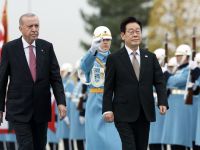The opening session of Bangladesh's new parliament Sunday was marred by a boycott by the main opposition party, which stayed away claiming its recent landslide election defeat was "massively rigged".
Fifty-six MPs of the defeated Awami League party of former prime minister Sheikh Hasina Wajed were absent as the 300-member Jatiya Sangsad met nearly a month after the election that gave Prime Minister Khaleda Zia's Bangladesh National Party-led Islamist alliance a record two-thirds majority.
It was the first time a party has boycotted an opening session.
Bangladesh National Party (BNP) deputy and former minister Jamiruddin Sircar was elected the new speaker, officials said.
Parliament will also need to elect a new president of the republic next month to succeed Shahabuddin Ahmed, whose tenure expires this month.
Ahmed, a retired chief justice who chaired Bangladesh's first caretaker government and conducted the first democratic elections in 1991, later gave his customary address to the session.
He asked the new lawmakers to forget past bickerings and to play their assigned role in parliament.
"This election of October 1, 2001 represents not merely a change of power from one party to another," he said, adding "a silent revolution has taken place" for major economic and political changes.
The BNP-led alliance, which includes the fundamentalist Jamaat-e-Islami party, swept to power after a campaign directed against corruption and terrorism.
Zia, the 56-year-old widow of slain president General Ziaur Rahman, became Bangladesh's first female premier when her BNP won in 1991 following nine years of pro-democracy campaigns that ended the military rule of General Hossain Muhammad Ershad.
Sheikh Hasina and her party deputies were sworn in as MPs on Wednesday although they refused to accept the election result, terming it "massively rigged", and so far have shown no sign of ending their parliament boycott.
At a protest rally in Dhaka, Sheikh Hasina vowed to intensify street campaigns against Zia's government, accusing it of intimidation of her party leaders and former ministers.
On Tuesday police raided homes of five former cabinet ministers and seized passports of two of them in connection with alleged corruption.
A boycott of parliament's opening session by any party is unprecedented even in the Bangladesh parliament's volatile history. The institution has often been interrupted by military intervention or marred by lengthy opposition boycotts.
Zia, elected Leader of the House, in a brief first address to the session congratulated her arch-foe Sheikh Hasina for leading her party's MPs to take the oath. But she regretted the boycott and appealed to Sheikh Hasina to join the parliament and discharge her constitutional responsibilities.
Twenty-two independents and MPs from opposition groups besides the Awami League were present at the opening session. They include a faction of Jatiya Party of Ershad, which secured 14 seats.
The Awami League won 62 seats in the 300-seat parliament, while the BNP-led alliance won 214 seats.
After taking oath on October 10 as Bangladesh's 14th prime minister since independence, Zia called for "national reconciliation" in her victory speech.
Both the BNP and the Awami League blame each other for most of Bangladesh's political and economic ills.
Last week Zia accused Sheikh Hasina's government of "rampant corruption", leaving behind a "ruined economy". She said her government would publish a report within three months.
But Sheikh Hasina said the accusations were "full of lies", claiming she had proof of corruption and economic mismanagement during Zia's last period as prime minister between 1991 and 1996 -- Dhaka, (AFP)
© 2001 Al Bawaba (www.albawaba.com)







